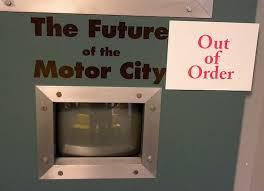 The biggest city bankruptcy ever, Detroit’s, is a shocker – or not. Inevitable, really. Detroit lost its signature industry (mostly) and with it over 60% of its peak population. It couldn’t downsize fast enough; and city services, rather than merely contracting, went to hell, driving out even more businesses and residents. But even if it could have resized appropriately (and avoided its prodigious mismanagement), Detroit still owed pension and health benefits to an army of retirees from a past workforce sized to a larger city.
The biggest city bankruptcy ever, Detroit’s, is a shocker – or not. Inevitable, really. Detroit lost its signature industry (mostly) and with it over 60% of its peak population. It couldn’t downsize fast enough; and city services, rather than merely contracting, went to hell, driving out even more businesses and residents. But even if it could have resized appropriately (and avoided its prodigious mismanagement), Detroit still owed pension and health benefits to an army of retirees from a past workforce sized to a larger city.

Political office-holders have always found it expedient to buy off public employee unions in so-called “collective bargaining.” Unlike such negotiations in the private sector, “management” is captive to the unions for political support and even campaign money. (Mainly Democrats, it must be said.) And while voters might balk at public employee wage levels obviously out-of-whack, future pension and healthcare promises sneak through the back door. This is what really destroyed Detroit. (And what 2011’s Wisconsin battle was about.)
So whereas most private sector pensions have long since shifted to “defined contribution” approaches (keying payouts to what employees put in), most public worker pensions are still “defined benefit” plans keyed to final year pay. And many furthermore allow gimmicks (like padding overtime) to inflate that figure.

And that further assumes retirees will die on schedule. Better not have any more medical breakthroughs.
(Disclosure: I get a very nice pension as a former NY state employee. New York’s pension fund is one of the least deficient; Illinois’ the worst. But New York, and especially its municipalities, face other severe fiscal problems.)
So states and localities are in a very deep hole, that gets deeper every year. The longer drastic reform is put off, the harder it gets. Already there is no politically palatable fiscal adjustment that could close the gap.
This is just one facet of the bigger problem I keep harping on: the gigantic mismatch between government’s “entitlement” promises (pensions, Social Security, Medicare, Medicaid, Obamacare, welfare, unemployment payments, disability, food stamps, etc., etc.) and the means to pay for them, as ever more people collect these benefits while ever fewer are productively employed to generate the wealth and taxes needed. President Obama seems oblivious to this inevitable future smash-up.
Back to Detroit, one bit in The Economist’s coverage caught my eye: “The Mayor is leading a campaign to shut down small businesses that do not comply with regulations – an odd priority for a city with no money.”
Odd? I’d say downright insane. This is the schizophrenia of liberals, always mewing about “good jobs at good wages” as if you could somehow have them without good businesses making good profits. (See my past post about over-regulation harming small business.)


In Detroit, the results of such laissez-faire could hardly be any worse than what we’ve seen till now. Nonregulation’s harm to a few would be overwhelmed by economic benefits for the many.
*With the courts to sort out claims of fraud, misfeasance, breach of contract, etc. But businesses that do their customers dirty don’t tend to stay in business. Successful ones are those making customers happy.
